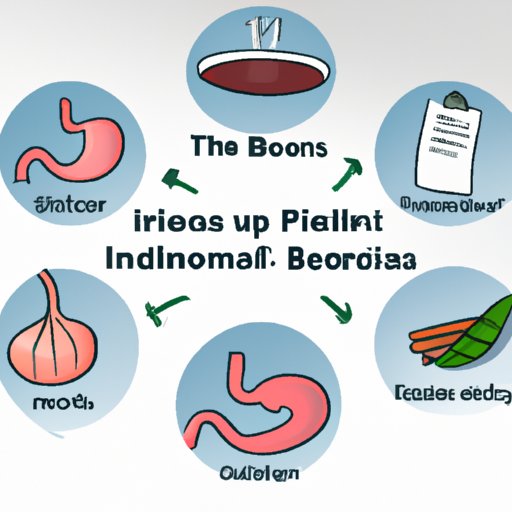
Introduction
IBS or Irritable Bowel Syndrome is a chronic digestive disorder that affects millions of people worldwide. The condition causes discomfort, abdominal pain, gas, bloating, and erratic bowel movements. It is essential to find ways to manage IBS symptoms as they have a significant impact on the quality of life. There are different approaches to combatting IBS, including natural remedies, medication options, mind-body techniques, homeopathy, FODMAP Diet, and coping strategies. In this article, we will explore these approaches in detail and provide tips to help manage IBS symptoms effectively.
Natural Remedies for IBS
Dietary and lifestyle modifications have proven successful for many people in easing IBS symptoms. Changing what you eat and how you live is key to managing IBS. Start by:
Eating Smaller Meals:
Consuming smaller portions instead of large meals can help reduce the severity of IBS symptoms. It’s also advised to eat slowly while chewing thoroughly, smoking cessation, avoiding alcohol and caffeine, and consuming more fiber-rich foods.
Avoiding Trigger Foods:
Foods that are known to trigger IBS symptoms — such as spicy foods, fatty foods, gas-producing foods like beans, cruciferous vegetables, sugars, and chocolates — should be avoided.
Increase Water Intake:
Drinking more water helps to flush out the intestines and will reduce the potential for constipation, which often complicates IBS symptoms. It’s essential to drink 8-10 glasses of water per day unless instructed otherwise by your physician.
Regular Exercise:
Physical exercise is beneficial in reducing IBS symptoms by stimulating normal contractions of the intestines, reducing stress hormones, and promoting better digestion. Try to engage in a regular exercise routine and aim for 150 minutes of moderate exercise per week.
Medication Options for IBS
Several medications can help alleviate IBS symptoms. However, the choices for medication may vary depending on the specific symptoms.
Pepto-Bismol and Anti-Diarrhea Meds:
Over-the-counter anti-diarrhea medications such as loperamide, and anti-spasmodic options including Pepto-Bismol, are commonly used to treat diarrhea and ease cramping.
Antidepressants and Antispasmodics:
Prescription medication such as low dose antidepressants, antispasmodics & anticholinergic can also be used to reduce pain and help control bowel movements. Talk to your physician, who will recommend the best medication to address your IBS symptoms.
Mind-Body Techniques
Irritable Bowel Syndrome often has a psychological impact, which is why mind-body techniques, such as meditation, yoga, and acupuncture, can be helpful.
Yoga and Gentle Exercise:
Yoga and other low-intensity forms of exercise can be beneficial for managing IBS symptoms. These practices integrate deep breathing, stretching, and relaxation techniques, which help reduce stress and stimulate better gut health. A few poses which can be useful for IBS include the child’s pose, seated forward bend, and cat/cow pose.
Meditation and Breathing Practice:
The use of regular breathing practice and meditation can also help alleviate IBS symptoms and reduce stress. Practice deep breathing, focus on the present, and positive affirmations.
Acupuncture Treatments:
Acupuncture is an ancient practice that is believed to balance energy in the body. Acupuncture points stimulate various parts of the body, which can ease digestive discomfort and improve breathing. Speak to your physician to learn more about how acupuncture may benefit your IBS symptoms.
Homeopathic Remedies
Homeopathic remedies such as teas, herbs, and supplements have shown effectiveness in reducing IBS symptoms.
Teas:
The consumption of herbal teas like peppermint and ginger root tea has soothing effects on the digestive system and can alleviate bloating and other IBS symptoms.
Supplements and Herbs:
Herbs such as aloe vera, turmeric, chamomile, and slippery elm can help suppress inflammation, reduce pain, and promote better digestion. Supplements like Omega-3, probiotics can enhance gut health and reduce inflammation.
However, herbal remedies and supplements can interfere with prescription medications; it’s essential to consult with your physician before trying any new homeopathic remedies.
FODMAP Diet
The FODMAP diet is a dietary approach that eliminates certain types of carbohydrates that can exacerbate IBS symptoms.
Elimination Phase:
In the initial stage of the FODMAP diet, you eliminate high FODMAP foods such as, apples, garlic, onions, broccoli, wheat products, and many other raw fruits and vegetables from your diet for a few weeks.
Reintroduction Phase:
After the elimination phase, foods are gradually reintroduced to assess personal triggers. The emphasis is placed on individual tolerance levels to FODMAP foods to weigh the outcome effectively.
Coping Strategies
Stress management is essential for managing IBS symptoms, and this can be achieved through various techniques such as:
Relaxation Techniques:
Practices such as deep breathing, progressive muscle relaxation, visualization, or guided imagery can help combat anxiety and alleviate stress.
Stress Management:
Regular exercise, proper sleep, spending time with loved ones, learning how to say “no”, and seeking support from professional services or support groups can help manage stress levels.
Conclusion
IBS can be challenging to manage. However, there are several resources and approaches that can help individuals reduce the severity of its symptoms. By following the natural remedies, medication options, mind-body techniques, homeopathic remedies, FODMAP diet, and coping strategies discussed in this article, IBS can be managed effectively. Make sure you talk to your physician before trying any new approach. Working with a qualified healthcare provider is essential to finding the best course of treatment for your IBS and personalizing your care.





